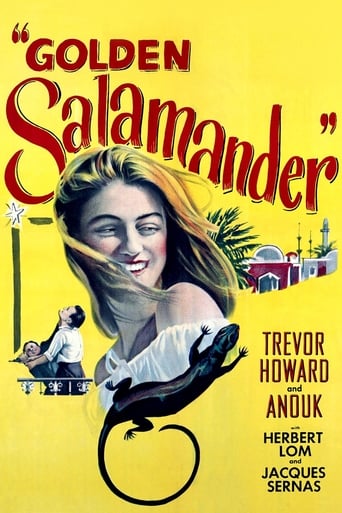clanciai
The most curious asset of this film is a very young and irresistible Anouk Aimée ("Anouk") as the innocent girl who is totally unaware of what is going on although her boyfriend is deeply mixed up in it, which makes her worried without knowing for what. As it happens, the archaeologist Trevor Howard enters and makes things happen in this off-side village in Tunisia where corruption flourishes, in which everyone is involved. It is therefore a rather unpleasant film, with Herbert Lom as villainous as ever, and Miles Malleson as inimtable as ever as the local chief of police, who isn't quite as innocent as he should be either. It all amounts to a bloody mess of troubles mainly for Trevord Howard himself, and it might seem objectionable that he falls for la belle Anouk while he knows the truth about her boyfriend, in whose case his meddling didn't quite work oui as he had intended. A key figure is Wilfred Hyde-White, constantly sitting drunk by the piano playing the wonderful "Clopin Clopant" and saying very little but in the end doing what is needed to resolve a hopeless situation just by a very small hint. He was never better, although he always was a crown jewel in every film he was in.
writers_reign
This is the kind of mediocrity that makes Old Mother Riley look cutting edge. There's barely one believable frame in the whole movie. For reasons clearly meant to 1) mislead and 2) generate interest the opening sequence finds Trevor Howard driving along what appears to be a coast road in a storm. He turns out to be an archaeologist. So much for suspense. He puts up at a sinister inn where a shabbily dressed Wilfrid Hyde White clearly having been frightened by Dooly Wilson in Casablanca is playing a jaunty version of Clopin Clopant on a beat-up upright ignored by several deadbeats led by Herbert Lom with drinks being dispensed by a young Anouk Aimee as if at Finishing School in Lausanne. It doesn't get any better. Unbelievably Howard really IS what it says on the tin and NOT a British agent, undercover cop, intrepid investigative reporter or anything the slightest bit interesting and the fact that he stumbles onto a gun-running syndicate is more embarrassing than sinister. If you like thrillers sans thrills this is for you and if you mistake Miles Malleson for Claude Rains or even Louis Renault then you got trouble, my friend, right here in Waterfront City.
worldofgabby
When I saw the cast for this, I figured the movie would either be very good or awful. Luckily, it was the former. Good acting, great cinematography, editing and a convincing character path make this movie a real classic. Of course there are the "exotic" Arabs, but their depiction is not as offensive as in most films of its era. The somewhat dazed performance by Anouk Aimee leads one to believe that she either had a lot of trouble with the English language, or overplayed her depressive qualities. The boar hunt sequence brings to mind the conclusion of the book "The Alexandria Quartet." Aside from these minor quibbles, I recommend The Golden Salamander to anyone with an interest in character development, intrigue, and film noir that isn't about people unjustly accused of criminal action, innocent people led into same, and heists gone wrong.
MARIO GAUCI
Watchable British thriller about gun-running in Post-WWII Tunisia with faint echoes of THE MALTESE FALCON (1941; except that the title artifact bears little relation to the main plot!), TO HAVE AND HAVE NOT (1944) and THE THIRD MAN (1949; not least the presence of two of its cast members), but is perhaps too low-key to be really memorable. Nonetheless, the film has a remarkable cast (Trevor Howard, Anouk Aimee', Herbert Lom, Walter Rilla, Miles Malleson, Jacques Sernas, Wilfrid Hyde-White) and nice, noir-ish atmosphere going for it - and is short enough (87 minutes, though some sources give this as 96!) to keep tedium at bay...which could result from its lack of incident (apart from a couple of confrontation scenes and a climactic fistfight between Howard and Lom) or the incongruous pairing of its two leads.


